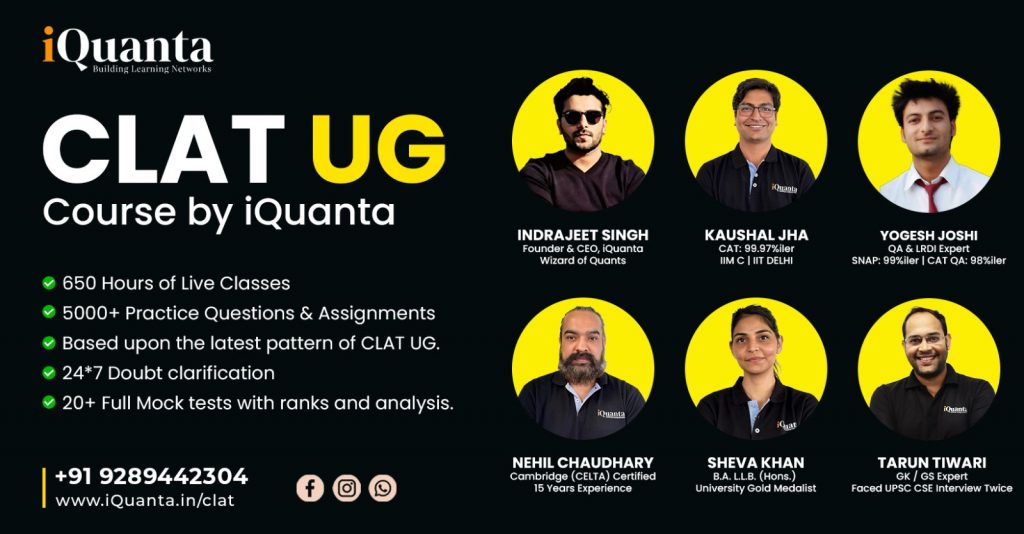In this article, we will learn about the CLAT Exam (Common Law Admission Test), what purpose, what exactly is CLAT, it’s exam pattern, syllabus, question breakup of sections, and where to prepare from for CLAT. This article will entail all the details of the purpose of CLAT and CLAT Exam Is For What Purpose.

What is CLAT 2025?
To understand CLAT exam is for what purpose, let’s first understand what is CLAT. CLAT full form stands for the Common Law Admission Test. It is a centralized entrance exam conducted in India for admissions to undergraduate (LLB) and postgraduate (LLM) law programs offered by various national law universities in India (NLUs) and other participating institutions across the country. CLAT is conducted annually by one of the participating NLUs on a rotational basis. CLAT Exam Is For What Purpose signifies that the exam assesses candidates’ aptitude in areas such as English, General Knowledge, Mathematics, Legal Aptitude, and Logical Reasoning. CLAT aims to standardize the admissions process for law colleges, ensuring fairness and transparency in the selection of candidates. It is a highly competitive exam and is widely recognized by law colleges and legal institutions in India. Let us dive into answering the question now, CLAT Exam Is For What Purpose?
CLAT Exam Is For What Purpose?
Let us cater to the main question, CLAT exam is for what purpose? and further we will discuss CLAT’s eligibility criteria, law colleges accepting CLAT score, CLAT syllabus, CLAT Exam pattern, and CLAT eligibility criteria.
Centralized Admission Process
- The Centralized Admission Process (CAP) is facilitated by the CLAT, which acts as a centralized examination for undergraduate (LLB) and postgraduate (LLM) law programs.
- CLAT streamlines the admission process for national law universities (NLUs) and other participating institutions, making it more accessible for aspiring law students.
- This centralized approach simplifies application procedures and ensures fairness and transparency in admissions.
Standardized Testing
- CLAT serves the crucial purpose of establishing a standardized testing mechanism for law school admissions.
- By evaluating all applicants on the same set of parameters, CLAT promotes fairness and transparency in the selection process.
- Standardization eliminates biases and variations inherent in different examination formats, providing a level playing field for all applicants.
Test Of Legal Aptitude
- A significant aspect of CLAT is its focus on assessing candidates’ legal aptitude, reasoning abilities, and academic skills.
- This emphasis ensures that admitted students possess the foundational knowledge necessary for successful legal studies.
- CLAT’s assessment of legal aptitude helps guarantee that candidates are well-prepared for the rigors of law school education.

CLAT Exam Pattern 2025
Let us understand the exam pattern of CLAT examination so that we are able to answer the main question CLAT Exam Is For What Purpose, in a better way.
| Sections | Sectional Weightage | No. of Questions |
|---|---|---|
| English Language | 20% | 22-26 |
| GK | 25% | 28-32 |
| Legal Reasoning | 25% | 28-32 |
| Logical Reasoning | 20% | 22-26 |
| Quantitative Techniques | 10% | 10-14 |
CLAT Eligibility Criteria 2025
The eligibility criteria 2025 of CLAT entrance test, to get admission in prestigious law schools or NLUs in India, is mentioned below:
- Educational Qualifications: Candidates should have completed their class 12th education from a recognized board to be eligible for CLAT entrance exam 2025.
- Minimum Marks Required: For General/OBC/PwD/OCI/PIO/NRI 45% and for SC/ST 40%.
- Age Limit: There is no age limit in CLAT entrance exam 2025
Career Opportunities After CLAT 2025
After understanding CLAT exam is for what purpose, let us understand the career opportunities after CLAT.
- Law Practice: After completing CLAT, many graduates opt to practice law. They may choose to work independently or join law firms, where they handle diverse cases ranging from criminal law to corporate law.
- Public Interest Law: CLAT graduates have the opportunity to work in the public interest sector, advocating for social justice, human rights, and environmental causes through non-profit organizations or international agencies.
- Civil Services: CLAT graduates can pursue careers in civil services, particularly in roles related to law and administration. This includes positions within the Indian Administrative Service (IAS) or the Indian Police Service (IPS).
- Corporate Law: Corporations rely on legal expertise for various matters such as compliance, contracts, and mergers. CLAT graduates can work as in-house counsels or legal advisors, providing guidance on legal issues within corporate entities.
- Judiciary Services: Some individuals aspire to become judges after gaining experience as lawyers. They prepare for judicial service examinations conducted by state or central governments to enter the judiciary services.
- Legal Entrepreneurship: CLAT graduates with an entrepreneurial spirit may establish their own law firms or legal consulting businesses, offering specialized services to clients and contributing to the legal industry.
- Arbitration and Mediation: Alternative dispute resolution (ADR), including arbitration and mediation, is a growing field. CLAT graduates can become arbitrators or mediators, facilitating resolution outside traditional court settings.
- Legal Research and Academia: Those interested in legal research and academia can become legal researchers, scholars, or professors. They contribute to legal literature, teach at law schools, and engage in academic research.
- Legal Consultancy: Another avenue for CLAT graduates is providing legal consultancy services. They offer specialized advice on legal matters, working as consultants for businesses or individuals.
- Legal Journalism: Combining legal knowledge with communication skills, CLAT graduates can pursue careers in legal journalism. They cover legal issues and developments for various media platforms, such as newspapers, magazines, or online platforms.
- Legal Process Outsourcing (LPO): CLAT graduates can explore careers in legal process outsourcing firms, which handle tasks such as research, document review, and drafting for international clients, contributing to the globalization of legal services.
- Intellectual Property Law: CLAT graduates with an interest in intellectual property law can specialize in this field, assisting clients in protecting and managing their intellectual property rights.
- Compliance and Regulatory Affairs: Many industries require legal professionals to ensure compliance with regulations. CLAT graduates can work in compliance and regulatory affairs roles, particularly in sectors like finance and healthcare.
- Cyber Law and Technology Law: With the rise of technology, CLAT graduates can specialize in cyber law or technology law, addressing legal issues related to the digital realm.
Important Topics For CLAT 2025
Now that we understand CLAT exam is for what purpose, let us uncover the important topics of the CLAT 2025 exam after CLAT Exam Is For What Purpose. The CLAT exam Syllabus is essential to understand as it will help the candidates get a better CLAT score and get into the prestigious national law universities in India.
English
- Vocabulary
- Synonyms and Antonyms
- Sentence Completion
- Idioms and Phrases
- Reading and Comprehension
- Syntax and Errors
Logical Reasoning
- Blood Relations
- Seating Arrangements
- Circular Arrangements
- Coding Decoding
- Clock and Calendars
- Syllogism
- Number Series
- Analogies
- Connectives
- Logical Sequences
- Arguments and Conclusions
- Direct Sense
- Statement and Assumption
Legal Reasoning
- Constitutional Law
- Jurisprudence
- Corporate Law
- Intellectual Property Law
- International Law
- Criminal Law
- Civil Law
- Legal Writing
- Tax Law
- Family Law
GK
- Indian Polity and Governance
- International Relations
- Economics and Finance
- Science and Technology
- Environment and Ecology
- Sports and Entertainment
- Static GK
Quantitative Techniques
- Number Systems
- Algebra
- Percentage
- Average
- Ratios and Proportions
- Profit and Loss
- Time Speed and Distance
- Work and Time
- Mensuration
- Mensuration
- Probability
- Statistical Estimation
Best CLAT Coaching
After understanding CLAT exam is for what purpose, let us discuss iQuanta’s services to budding Law aspirants. Click on the banner below or visit iQuanta’s website to get detailed course details.

CLAT Exam Is For What Purpose?: FAQs
What jobs do you get after CLAT?
After appearing for CLAT 2025, it opens doors to job opportunities in the field of Criminal Law, Business Law, Family Law, Cyber Law, Military Law, Corporate Law, Labour Law, Bankruptcy Law, Environmental Law, International Law, Intellectual Property Law, and Commercial Law.
Can I become a lawyer without CLAT?
Yes! Taking the CLAT is not necessary to become a lawyer. Candidates can enroll in undergraduate and postgraduate law courses offered by various universities and law schools in India. However, those who wish to gain admission to one of the National Law Universities in India (except NLU Delhi) must take the CLAT entrance test as it only accepts CLAT score.
Is law difficult to study in India?
Compared to other professional courses like B.Tech and MBBS, pursuing an LLB, whether it’s a three-year or five-year program, is generally not as difficult.
Is LLM better than LLB?
The LLM graduates have better pay opportunities than LLB graduates. The earning potential of LLM graduates is also higher than that of LLB graduates.
Which subject is good for Law?
An undergraduate degree is the minimum requirement for admission into law school. While many lawyers have degrees in subjects such as English, economics, political science, philosophy, journalism, mathematics, and business, there is no official recommendation for a preferred major for law students.
Is Law a good career?
Law is one of the most prestigious career options in India, studying and graduating from a national law university is the most sought-after career path. It offers immense potential for personal and professional growth.

